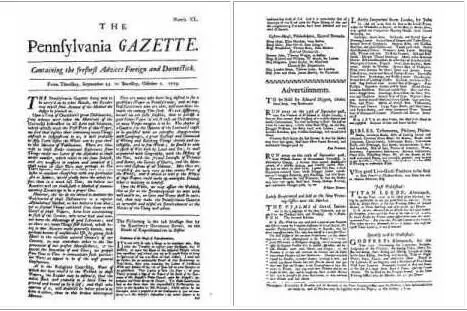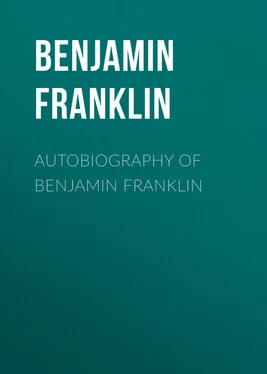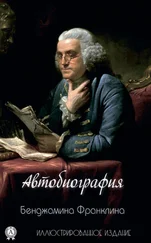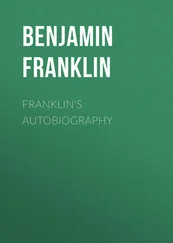Бенджамин Франклин - Autobiography of Benjamin Franklin
Здесь есть возможность читать онлайн «Бенджамин Франклин - Autobiography of Benjamin Franklin» — ознакомительный отрывок электронной книги совершенно бесплатно, а после прочтения отрывка купить полную версию. В некоторых случаях можно слушать аудио, скачать через торрент в формате fb2 и присутствует краткое содержание. Жанр: foreign_prose, foreign_antique, на английском языке. Описание произведения, (предисловие) а так же отзывы посетителей доступны на портале библиотеки ЛибКат.
- Название:Autobiography of Benjamin Franklin
- Автор:
- Жанр:
- Год:неизвестен
- ISBN:нет данных
- Рейтинг книги:4 / 5. Голосов: 1
-
Избранное:Добавить в избранное
- Отзывы:
-
Ваша оценка:
- 80
- 1
- 2
- 3
- 4
- 5
Autobiography of Benjamin Franklin: краткое содержание, описание и аннотация
Предлагаем к чтению аннотацию, описание, краткое содержание или предисловие (зависит от того, что написал сам автор книги «Autobiography of Benjamin Franklin»). Если вы не нашли необходимую информацию о книге — напишите в комментариях, мы постараемся отыскать её.
Autobiography of Benjamin Franklin — читать онлайн ознакомительный отрывок
Ниже представлен текст книги, разбитый по страницам. Система сохранения места последней прочитанной страницы, позволяет с удобством читать онлайн бесплатно книгу «Autobiography of Benjamin Franklin», без необходимости каждый раз заново искать на чём Вы остановились. Поставьте закладку, и сможете в любой момент перейти на страницу, на которой закончили чтение.
Интервал:
Закладка:
His book is the record of that unusual life told in Franklin's own unexcelled conversational style. It is said that the best parts of Boswell's famous biography of Samuel Johnson are those parts where Boswell permits Johnson to tell his own story. In the Autobiography a no less remarkable man and talker than Samuel Johnson is telling his own story throughout.
F. W. P.The Gilman Country School,
Baltimore, September, 1916.

Pages 1 and 4 of The Pennsylvania Gazette , the first number after Franklin took control. Reduced nearly one-half. Reproduced from a copy at the New York Public Library.
I
ANCESTRY AND EARLY YOUTH IN BOSTON
3 3 A small village not far from Winchester in Hampshire, southern England. Here was the country seat of the Bishop of St. Asaph, Dr. Jonathan Shipley, the "good Bishop," as Dr. Franklin used to style him. Their relations were intimate and confidential. In his pulpit, and in the House of Lords, as well as in society, the bishop always opposed the harsh measures of the Crown toward the Colonies.—Bigelow.at the Bishop of St. Asaph's , 1771.
DEAR SON: I have ever had pleasure in obtaining any little anecdotes of my ancestors. You may remember the inquiries I made among the remains of my relations when you were with me in England, and the journey I undertook for that purpose. Imagining it may be equally agreeable to you to know the circumstances of my life, many of which you are yet unacquainted with, and expecting the enjoyment of a week's uninterrupted leisure in my present country retirement, I sit down to write them for you. To which I have besides some other inducements. Having emerged from the poverty and obscurity in which I was born and bred, to a state of affluence and some degree of reputation in the world, and having gone so far through life with a considerable share of felicity, the conducing means I made use of, which with the blessing of God so well succeeded, my posterity may like to know, as they may find some of them suitable to their own situations, and therefore fit to be imitated.
That felicity, when I reflected on it, has induced me sometimes to say, that were it offered to my choice, I should have no objection to a repetition of the same life from its beginning, only asking the advantages authors have in a second edition to correct some faults of the first. So I might, besides correcting the faults, change some sinister accidents and events of it for others more favourable. But though this were denied, I should still accept the offer. Since such a repetition is not to be expected, the next thing most like living one's life over again seems to be a recollection of that life, and to make that recollection as durable as possible by putting it down in writing.
Hereby, too, I shall indulge the inclination so natural in old men, to be talking of themselves and their own past actions; and I shall indulge it without being tiresome to others, who, through respect to age, might conceive themselves obliged to give me a hearing, since this may be read or not as anyone pleases. And, lastly (I may as well confess it, since my denial of it will be believed by nobody), perhaps I shall a good deal gratify my own vanity . 4 4 In this connection Woodrow Wilson says, "And yet the surprising and delightful thing about this book (the Autobiography ) is that, take it all in all, it has not the low tone of conceit, but is a staunch man's sober and unaffected assessment of himself and the circumstances of his career."
Indeed, I scarce ever heard or saw the introductory words, " Without vanity I may say ," etc., but some vain thing immediately followed. Most people dislike vanity in others, whatever share they have of it themselves; but I give it fair quarter wherever I meet with it, being persuaded that it is often productive of good to the possessor, and to others that are within his sphere of action; and therefore, in many cases, it would not be altogether absurd if a man were to thank God for his vanity among the other comforts of life.
Gibbon and Hume, the great British historians, who were contemporaries of Franklin, express in their autobiographies the same feeling about the propriety of just self-praise.
And now I speak of thanking God, I desire with all humility to acknowledge that I owe the mentioned happiness of my past life to His kind providence, which lead me to the means I used and gave them success. My belief of this induces me to hope , though I must not presume , that the same goodness will still be exercised toward me, in continuing that happiness, or enabling me to bear a fatal reverse, which I may experience as others have done; the complexion of my future fortune being known to Him only in whose power it is to bless to us even our afflictions.
The notes one of my uncles (who had the same kind of curiosity in collecting family anecdotes) once put into my hands, furnished me with several particulars relating to our ancestors. From these notes I learned that the family had lived in the same village, Ecton, in Northamptonshire, 5 5 See Introduction .
for three hundred years, and how much longer he knew not (perhaps from the time when the name of Franklin, that before was the name of an order of people, 6 6 A small landowner.
was assumed by them as a surname when others took surnames all over the kingdom), on a freehold of about thirty acres, aided by the smith's business, which had continued in the family till his time, the eldest son being always bred to that business; a custom which he and my father followed as to their eldest sons. When I searched the registers at Ecton, I found an account of their births, marriages and burials from the year 1555 only, there being no registers kept in that parish at any time preceding. By that register I perceived that I was the youngest son of the youngest son for five generations back. My grandfather Thomas, who was born in 1598, lived at Ecton till he grew too old to follow business longer, when he went to live with his son John, a dyer at Banbury, in Oxfordshire, with whom my father served an apprenticeship. There my grandfather died and lies buried. We saw his gravestone in 1758. His eldest son Thomas lived in the house at Ecton, and left it with the land to his only child, a daughter, who, with her husband, one Fisher, of Wellingborough, sold it to Mr. Isted, now lord of the manor there. My grandfather had four sons that grew up, viz.: Thomas, John, Benjamin and Josiah. I will give you what account I can of them at this distance from my papers, and if these are not lost in my absence, you will among them find many more particulars.
Thomas was bred a smith under his father; but, being ingenious, and encouraged in learning (as all my brothers were) by an Esquire Palmer, then the principal gentleman in that parish, he qualified himself for the business of scrivener; became a considerable man in the county; was a chief mover of all public-spirited undertakings for the county or town of Northampton, and his own village, of which many instances were related of him; and much taken notice of and patronized by the then Lord Halifax. He died in 1702, January 6, old style, 7 7 January 17, new style. This change in the calendar was made in 1582 by Pope Gregory XIII, and adopted in England in 1752. Every year whose number in the common reckoning since Christ is not divisible by 4, as well as every year whose number is divisible by 100 but not by 400, shall have 365 days, and all other years shall have 366 days. In the eighteenth century there was a difference of eleven days between the old and the new style of reckoning, which the English Parliament canceled by making the 3rd of September, 1752, the 14th. The Julian calendar, or "old style," is still retained in Russia and Greece, whose dates consequently are now 13 days behind those of other Christian countries.
just four years to a day before I was born. The account we received of his life and character from some old people at Ecton, I remember, struck you as something extraordinary, from its similarity to what you knew of mine. "Had he died on the same day," you said, "one might have supposed a transmigration."
Интервал:
Закладка:
Похожие книги на «Autobiography of Benjamin Franklin»
Представляем Вашему вниманию похожие книги на «Autobiography of Benjamin Franklin» списком для выбора. Мы отобрали схожую по названию и смыслу литературу в надежде предоставить читателям больше вариантов отыскать новые, интересные, ещё непрочитанные произведения.
Обсуждение, отзывы о книге «Autobiography of Benjamin Franklin» и просто собственные мнения читателей. Оставьте ваши комментарии, напишите, что Вы думаете о произведении, его смысле или главных героях. Укажите что конкретно понравилось, а что нет, и почему Вы так считаете.










![Benjamin Franklin - Memoirs of Benjamin Franklin; Written by Himself. [Vol. 2 of 2]](/books/747975/benjamin-franklin-memoirs-of-benjamin-franklin-wr-thumb.webp)
![Benjamin Franklin - Memoirs of Benjamin Franklin; Written by Himself. [Vol. 1 of 2]](/books/748053/benjamin-franklin-memoirs-of-benjamin-franklin-wr-thumb.webp)